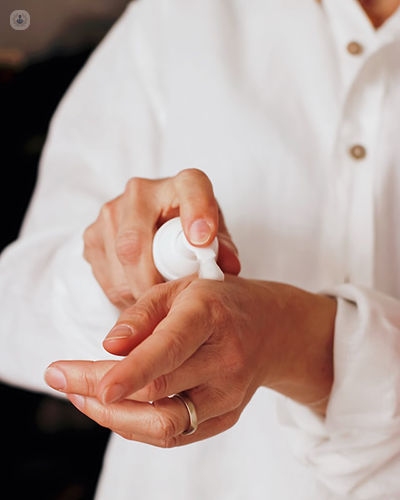Eczema: Detailed insight on the triggers, treatment and possible complications
Escrito por:With a number of different forms of the condition and a range of potential causes, eczema can affect our skin in a variety of ways. We invited highly respected consultant dermatologist Dr Rachel Fisher to share her expert insight on the different types of eczema and their associated symptoms and causes, as well as potential triggers that patients should be aware of. The leading specialist also discusses available treatment options, including innovative approaches which are proving highly effective in severe cases of eczema.

What are the different types of eczema?
Eczema is an umbrella term used to describe a group of conditions which cause dry, red, itchy skin. They can first present in childhood or later in life.
Some types of eczema are endogenous (internal), such as atopic eczema, but others can have external influences, including irritant contact and allergic contact dermatitis.
Seborrhoeic dermatitis is associated with the yeast Malassezia, which can cause an eczema on the head and neck. Azeototic eczema is caused by excessive drying of the skin (sometimes due to the natural loss of the natural moisturising factor with increasing age) and it is thought that discoid eczema is associated with the bacteria staphylococcus aureus.
Venous eczema affects the lower legs and is generally caused by a dysfunction in valves in the lower limb veins leading to fluid leakage and skin irritation and tends to be chronic. Pompholyx eczema causes very itchy small watery blisters along the borders of the fingers.
Rarely, eczema can affect a large proportion of the skin and if it involves more than 90 per cent of the body surface area it is called erythroderma and can be quite serious.
How can dermatologists accurately diagnose and differentiate between different types?
On the whole, dermatologists can diagnose most types of eczema clinically after taking a detailed history and performing a full skin assessment. It can be useful to perform skin swabs (bacterial and/or viral) to check for secondary infection of the skin.
Occasionally, when the diagnosis isn’t clear, or hasn’t responded to standard treatment, a small skin biopsy can be helpful. Patch testing can be performed if the dermatologist suspects a possible allergic contact dermatitis.
What are the primary triggers and aggravating factors of eczema?
For some types of eczema, in particular atopic eczema, there is a genetic component to it. Atopic eczema is often associated with other conditions, such as hay fever and asthma, which are all referred to as ‘atopic’ conditions. Irritant contact dermatitis usually affects the hands and is associated with frequent hand washing and using soap containing some products, hand sanitiser and/or chemicals.
Allergic contact dermatitis can present wherever the contact allergen is coming into contact with the skin. Common sites include eczematous eruptions on the face and neck or hands. Common culprits include fragrances, hair dyes, metals, acrylates and medicaments but there are lots of potential contact allergens. Identifying contact allergens through patch testing can help patients identify which products to avoid.
Stress doesn’t usually directly cause eczema but there is a lot of evidence that it can lower the immune system and exacerbate or precipitate eczema. This can be difficult to control but is useful to be aware of. Viral infections can cause stress on the body which can also trigger flares.
Products containing soaps, foaming agents and fragrances can further dry and irritate the skin in someone with eczema. It is usually recommended therefore that the use of these products in minimised or avoided and instead, someone uses a soap substitute (see further information below).
A lot of patients with eczema find the weather and humidity can impact their skin. Generally, drying conditions such as the use of central heating in a home can exacerbate eczema, but it is often difficult to avoid this during winter months.
What are the most common treatment options for eczema?
The majority of eczema can be managed with skin directed topical treatment. A bland greasy moisturiser applied to all involved skin at least twice a day is a good starting point. It is important to apply any topical treatment in the direction of the hair growth rather than rubbing it in, to prevent secondary folliculitis (a spot like rash).
Using a soap substitute (emollient as a wash) is recommended as soap-containing products (such as bubble bath, shower gel) on the skin can lead to further dryness and irritation.
Topical corticosteroids are the mainstay of treatment and are available in different strengths ranging from mild to very potent. Sometimes combination products are used which contain antibacterial and anti-yeast medications. These tend to be used more intensely during acute flares with recommendations to step down to ‘maintenance treatment’ (usually twice a week on two consecutive days) in between flares to keep things under control.
There are often concerns regarding the use of long term topical steroids and skin thinning. While these concerns are valid, if the topical steroids are used as directed by a dermatologist, they are very safe and effective treatments. Sometimes alternative treatments such as calcineurin inhibitors can be used in a similar way to topical steroids but without the skin thinning side effects.
When topical treatment is no longer effective in managing the eczema, it is important to see a dermatologist to consider escalation of treatment. A dermatologist will consider the most appropriate further treatment options and discuss these with you. Treatment options include a course of narrow band UVB, Psoralen with UVA or systemic treatment (tablets and injections).
What are some of the potential complications associated with eczema?
Skin infections are a common complication of eczema and can be caused by both bacteria and viruses. By treating the inflammatory component of eczema well, the risk of infection is reduced because the skin barrier is less impaired.
Patients often report their skin feels itchier at night which can have a significant impact on their sleep quality and therefore ability to function in the day. This is likely to be due to several different factors, including there being less distractions from the constant itch at night and differing temperatures and environmental exposures.
It is important to try and break the itch-scratch cycle wherever possible as this can exacerbate things. Again, with good active treatment of acute flares alongside regular maintenance treatment, the itching and sleep disturbance often reduces. Choosing bed linen which is 100 per cent cotton is also a good idea as this is soft in texture, cool and absorbs moisture well.
Dermatologists will often give patients a treatment regime for these two different phases ‘acute flares’ and ‘maintenance’ treatment and tailor them to the individual.
There can be significant psychological impacts of eczema as well as links with anxiety and depression. It is important that your dermatologists acknowledges this and finds a way to support and help you. Cognitive behavioural therapy (CBT) can be helpful as well as habit reversal techniques. There are lots of online resources available as well as support groups such as the National Eczema Society who can help direct patients to helpful advice and treatment.
Is there any emerging research or advancements in the understanding and treatment of eczema?
It is an exciting time with regards to advances in eczema management, particularly for those who have struggled with severe eczema for a long time and have ‘run out’ of traditional treatment options. For some time now we have had an injectable ‘biologic’ medication called Dupilumab which has been approved by NICE (the National Institute for Health and Clinical Excellence) to treat eczema, which works by trying to prevent the body’s immune system from overreacting (which causes the eczema).
More recently, further biologic medications have become available including Tralokinumab and a group of medications known as JAK inhibitors (Abrocitinib, Baricitinib and Upadacitinib). There are fairly strict criteria in order for patients to access these medications and require patients to have a certain severity of eczema and have already tried other systemic medication first.
If you are suffering with eczema and would like to schedule a consultation with Dr Fisher to discuss your treatment options, you can do so by visiting her Top Doctors profile.


